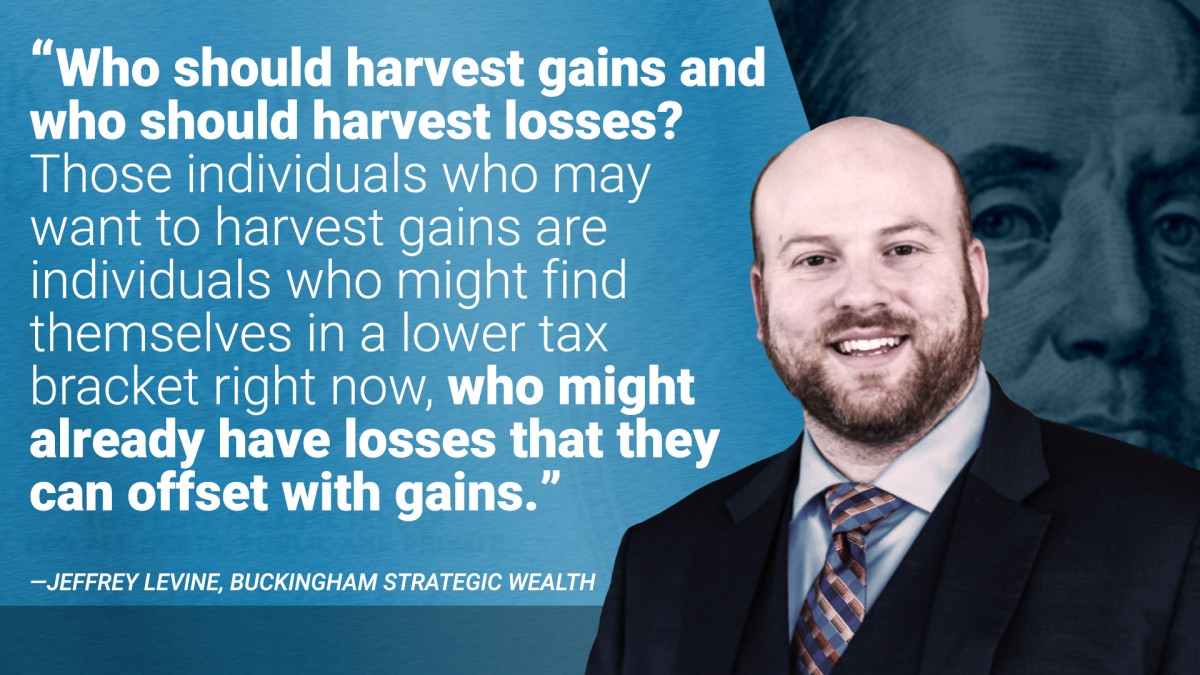Summer is in full swing and most of us would rather be focused on graduations, family reunions, barbecues, and vacations. But, TheStreet is going to put a pause on those warm and fuzzy moments and turn the spotlight on tax strategies. Really, this is a year-long effort.
While you’re sitting at the beach, take some time to read about tax strategies. There is so much to learn about capital gains and tax harvesting. For instance, did you know that capital gains aren’t just for rich people? Anyone who sells a capital asset should know that capital gains tax may apply. That’s Right. “Anyone who sells a capital asset should know that capital gains tax may apply”, according to our partners at TurboTax.
Who Should Harvest Gains and Who Should Harvest Losses?The question then is “Who should harvest capital gains, and who should harvest losses?”
“Those individuals who may want to harvest gains are individuals who might find themselves in a lower tax bracket right now, who might already have losses that they can offset with gains, so as to minimize the total tax impact there. It might also be a situation where you are in the 10 or the 12 percent ordinary tax bracket,” According to Jeffrey Levine, CPA and tax pro from Buckingham Strategic Wealth Partners, “Because if you’re in the 10% or 12% ordinary bracket, then your capital gains, your long-term capital gains that are, are actually taxed at a 0% rate.”
Read More: 5 Things You Should Know About Capital Gains Tax
Watch the video above for Retirement Daily Robert Powell’s extended conversation with Levine.
Our TurboTax Live experts look out for you. Expert help your way: get help as you go, or hand your taxes off. You can talk live to tax experts online for unlimited answers and advice OR, have a dedicated tax expert do your taxes for you, so you can be confident in your tax return. Enjoy up to an additional $20 off when you get started with TurboTax Live.
Recommended: Capital Gains and Tax-Loss Harvesting – Explained With Examples
Quotes| Is Tax Harvesting Really Worth It? Guide and Examples Jeffrey Levine, Chief Planning Officer, Buckingham Strategic Wealth Jeffrey Levine, Chief Planning Officer, Buckingham Strategic WealthQ&A (Video Transcript)Robert Powell: What are the pros and cons of harvesting capital gains and losses? Well, here to talk with me about that is Jeffrey Levine from Buckingham Wealth Partners. Jeffrey, what words of wisdom do you have for us?
Jeffrey Levine: Well, when we’re talking about gains and losses, we really should split it into those, gains and losses. Who should harvest gains and who should harvest losses? Those individuals who may want to harvest gains are individuals who might find themselves in a lower tax bracket right now, who might already have losses that they can offset with gains, so as to minimize the total tax impact there. It might also be a situation where you are in the 10 or the 12 percent ordinary tax bracket. Because if you’re in the 10% or 12% ordinary bracket, then your capital gains, your long-term capital gains that are, are actually taxed at a 0% rate. And as I always say, Bob, the only thing better than not paying taxes, is paying tax at a 0% rate because it creates a basis, it’s all after-tax money. You can do with it what you want.
So those are individuals who absolutely should be thinking about taking capital gains when they have them. Again, 10% or 12% bracket, that’s up to for married couples, about $100,000 of income before taking a standard deduction even. So, it’s not a small group of individuals. A lot of people fall into this category.
Now, as far as long-term capital losses or capital losses in general. If you have them, it’s generally best to take those losses and then maybe reinvest in something else or to sit on the sideline for a period of 30 days. And then if you really like the investment, buy it back. It’s important to wait that 30 days because you don’t want to be subject to something called the wash sale rule, which would prohibit you from taking the loss now.
But those losses are valuable. You can use them today to offset other gains, or if you don’t have gains or your losses exceed whatever gains you had, you can claim up to $3,000 of those losses and write it off or deduct it, if you will, from your other ordinary income, which could be quite a good savings depending upon what tax bracket you’re in.
Editor’s Note: TheStreet’s Zach Faulds produced this video and contributed to the writing of this article.
